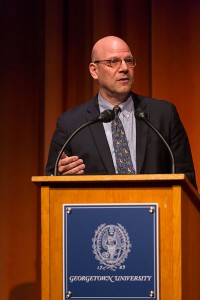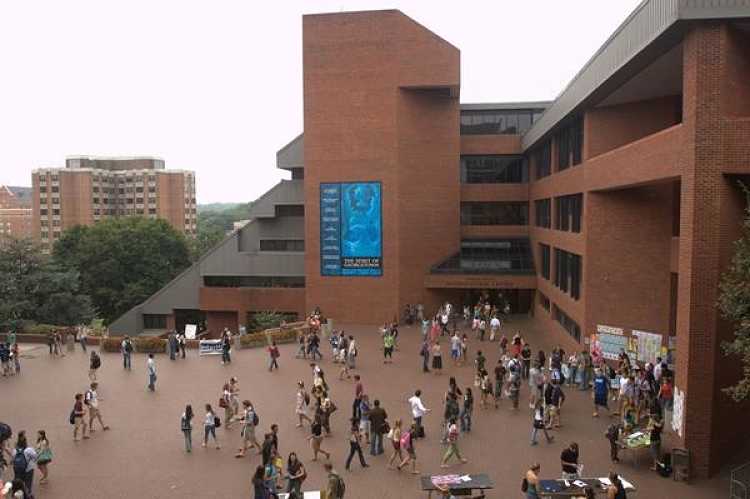This speech was delivered on Wed., June 22, at the Global Pre-Conference to the TCG Conference at Georgetown University in Washington, D.C.
Let me tell you why I’m here and why I am so pleased that I am invited to spend some time with you and welcome you here today on behalf of Georgetown and the School of Foreign Service. First, I should say that the School of Foreign Service is extremely pleased to welcome this year the Laboratory for Global Performance and Politics as part of the School of Foreign Service. We think it is an absolutely critical part of our mission, and I want to tell you a little about that and why we are so excited to welcome the Lab.
First and foremost, I am the dean of the School of Foreign Service. The School of Foreign Service, which sounds like a training ground for diplomats, actually was created before the U.S. Foreign Service by a Jesuit institution here in Georgetown, which thought about foreign service not as a career, but “service” as an approach or ethos. We are dedicated to the principle of engagement with the world, which we posit as an obligation and a responsibility of all of our students.

The School of Foreign Service is the oldest school of international affairs in the United States. We are about to reach our 100th anniversary in 2019. We were started just after the conclusion of WWI—in fact, a few days after the armistice. The United States had been an isolationist power for most of the 19th century and was pulled into world affairs through a violent global conflict. As the war ended, the founders of the school tried to think about what was next. They settled on a very bold mission: to create a school that could foster and build the foundation for peace in the 20th century. Indeed, the school’s founder, Edmund Walsh, framed the announcement of the school with the following words: “Unprepared as we were for war, we are resolved not to be unprepared for the peace.”
So they thought of how to build an educational program that would actually serve as the foundation for peace after such a violent global conflict. Of course, central to the school’s educational mission was the effort to promote intercultural understanding as the key foundation for peace. In fact, the mission statement of the school was “peace through understanding.” One of the first aspects of this mission was to understand history, to understand politics, to understand the economics of different parts of the world as a prelude for better understanding of what is happening, what is guiding, what is motivating world affairs. Language, and language training, were seen as critical parts of the school.
But from the very early stages of the school’s history, performance and culture were seen as an absolutely essential part of building the foundation of peace and security. In 1919, when the school was created, international performance was still a rarity—especially in sleepy Washington, D.C. So in the 1920s, the school for the first time tried to open up a window into the world by bringing global performance onto campus. The school asked each embassy in Washington, D.C., to sponsor a cultural evening on campus. This was a radical notion, believe it or not, in 1919—the first time that international performance was actually brought to campus.
It’s true that the embassies’ performances may not have been of the highest quality of artistic standard. But nevertheless, it was done. And over the years, we have continued to place emphasis on culture and performance as an important part of an understanding of world affairs. In fact, one of the most important academic majors in the School of Foreign Service today is called “Culture & Politics.” Fortunately over the years, we have left the performance aspects to the artists, not the embassies.
Nevertheless, over time, I think that we have lost some of that critical engagement with performance and the power of performance that motivated the school in those early years. When I came on as dean, I was so thrilled to reach out to bring the Lab into the School of Foreign Service, and to bring performance back into the foundation of global affairs and thinking about global affairs.
I am particularly excited about what you are doing here today, the theme “Finding Home: Migration, Exile, and Belonging,” because it is absolutely critical to our school’s mission and absolutely critical to my own personal journey that I have made over many years at the World Bank, and now here at the school.

Let me tell you why I am so thrilled that you are talking about this today. As many of you may know, or have seen from the last report from the UNHCR, 65 million people are currently faced with the travails of forced migration. That is forced migration, not voluntary migration, as a result of conflict, violence, and deprivation. This is the highest number of forced migrants ever recorded by the UNHCR. So we are in the midst of a tremendous global crisis.
I am an economist and political scientist by training, so I am going to give you some numbers—probably not the first thing you do in the theatre profession. But I think it is important for us to understand how critical this is. Right now, only 14 percent of the world’s extreme poor live in conflict affected areas. Most of the world’s extreme poor, those who live on $1.25 a day, which is the definition of extreme poor, live now still in the large populated countries like China, India, Indonesia, and Brazil. But, if we look just one generation ahead—if we look 20-25 years in the future, given what is happening in economies around the world and the rapid increase in growth rates in these highly populated countries—we see that while India, China, and other large counties are rapidly reducing the number of extreme poor within their countries, there are other countries that are locked in conflict. And currently there are 36 countries around the world in active conflict, and of those countries 90 percent of them have been in conflict for over 10 years. So the likelihood that they will remain in conflict far into the future continues.
In 25 years, 70 percent of the world’s poor will be concentrated in these fragile and conflict-affected countries. So the world is changing rapidly. There is growth, which is encouraging, around the world leading to poverty reduction. But as a result of conflict, the world’s poor are increasingly concentrated in a group of countries that are more and more isolated each from the global economy, from global political integration. And what is going to happen as that poverty gets worse and worse, as that group of countries gets further and further away from trend of increasing global prosperity, the desire to leave—the desire to get out, the desire to look for a better future—increases. Right now, 85 percent of the world’s forced migration comes from conflict-affected countries. So if you just project 20-25 years, you’re going to see that the problem that we are facing now—from which we have already the largest number of forced migrants ever recorded—will only get worse and worse as the problems become more extreme and as the gap, as the inequality, as the isolation of the nations impacted by conflict gets more and more extreme.
And what worries me most, especially as the dean of a school training the new generation of people to be engaged in global politics, is that at a time when we should be most concerned about this problem, we actually see the dialogue turning in the opposite direction. Here in the United States, instead of thinking about the root causes of migration—why are people feeling compelled to leave their homes, to undertake perilous journeys, and to face what is often a hostile welcome?—we’re talking about building walls. We’re talking about excluding groups of people on the basis of their religion or ethnic background.
This is not only in the United States. We are on the cusp of a historic election in Britain, which in a couple of days may choose to leave the European Union. Why? Because of the fear and hate-mongering associated with migration. In France, in Germany, across Europe, we are seeing the rise of right-wing parties, often coming to power on one issue: migration and fear. So instead of a national political dialogue that is confronting the problems that this world is facing—that is forcing 65 million people to leave their home in search for belonging somewhere else—at that very moment, our political dialogue has taken a turn for the worse: inward-looking, isolationist, tired of engaging in the world. People don’t even want to talk anymore about situations like Afghanistan, Syria, and Iraq. Rather they want to talk about the fear, the concern of “the other,” and the risks to national identity. I am so worried about the stalemate in the national political dialogue because as an economist and as a political scientist, I see that data doesn’t matter, political realities don’t matter, and international alliances don’t matter. This is not a set of issues that is being talked about in a rational way—about what is happening to the world economy and what is happening to politics. There is something more deep-rooted that is leading this fear.
And that is why I think this effort that you are doing today is so critical. Because what is going to impact that dialogue? It’s narrative. It’s humanizing the story of these 65 million people who are impacted. Humanizing not only their flight, but their stories and their histories in their home countries—why they’re leaving, what they’re seeking, what they are trying to do, what their experience is. This has never been more important, and I think the power of performance, the power of storytelling, and the power of narrative, are absolutely essential. In my mind, it is one of the only things that can actually have an influence on the political dialogue in this very, very peculiar moment in the politics of the United States and Europe.
It is on that basis that I am absolutely thrilled that we here at Georgetown and the School of Foreign Service, with our mission as a Jesuit institution to reach out to those boundaries, to reach out to those borders, and to see the world from the periphery, are inviting you, who are doing this in your day-to-day lives through the power of performance, through the power of narrative, through the power of storytelling. It is wonderful to welcome you here; we see this is core to our mission and to the changing the political dialogue around the world. I wish you a very productive, exciting day. I hope you get a wonderful opportunity to exchange your ideas and your efforts and help build the foundation of what this school was originally created for: peace. Thank you very much.
Joel Hellman is the dean of the School of Foreign Service at Georgetown University.

